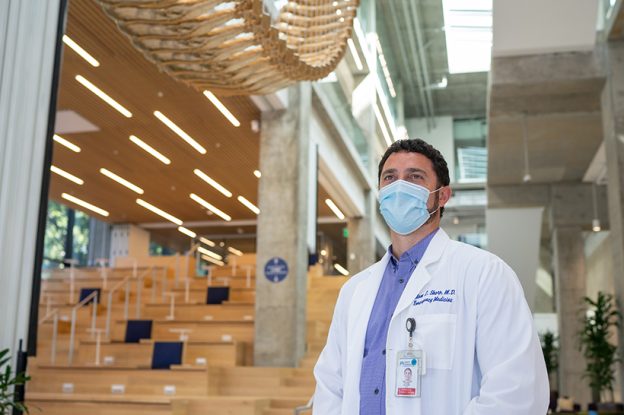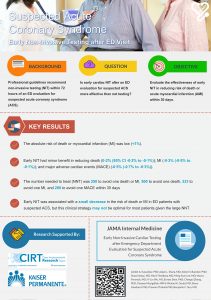
Value of quick noninvasive follow-up tests for chest pain patients questioned
Researchers at Kaiser Permanente are always working to find better and more cost-effective tests and treatments possible for members.
Recently, Adam Sharp, MD, MSc, and Aniket Kawatkar, PhD, MS, of Kaiser Permanente Southern California Department of Research & Evaluation led a team evaluating the effectiveness of noninvasive cardiac tests, such as treadmill stress tests, within 72 hours of discharge in reducing the risk of death or heart attacks for patients who had been seen at the emergency department for chest pain, but had not had a heart attack (also known as an acute myocardial infarction).
“Our study found that only 1 in 250 patients evaluated in the emergency department with suspected acute coronary syndrome may benefit from rapid cardiac stress testing,” said Dr. Sharp. “These results may influence recommendations for these tests, especially among low-risk patients.”
Evidence supports regional standards
The study was published October 5, 2020, in JAMA Internal Medicine. The research also was featured in TCTMD, an online news source focused on cardiovascular disease produced by the Cardiovascular Research Foundation. This evidence supported the current Kaiser Permanente Southern California recommendations to avoid 72-hour stress testing in low-risk chest pain patients.
Current U.S. guidelines recommend noninvasive cardiac testing within 72 hours of an emergency department evaluation for suspected acute coronary syndrome. However, some advisory bodies and several previous studies using different inclusion criteria and risk factors have come to other conclusions.
Chest pain is a common reason people go to emergency department
Chest pain is the second most common reason people go to the emergency department and every year, millions of people are evaluated. Within Kaiser Permanente Southern California, that means nearly 30,000 visits and evaluations a year. However, less than 13% are diagnosed with myocardial infarction.
This study used a retrospective cohort of 79,040 adults who came into the emergency department with chest pain and had heart attack ruled out between January 2015 and December 2017. Researchers compared the effectiveness of early noninvasive cardiac testing with no testing in patients and then followed them for up to 30 days from their date of discharge.
Study findings point to very low risk
The mean age of the cohort was 57 years, and 16,164 (21%) patients had completed early non-invasive cardiac testing. The study found that:
- The absolute risk of death or myocardial infarction within 30 days was low, less than 1%.
- Early noninvasive cardiac testing had minor benefit in reducing the absolute composite risk of death or myocardial infarction (-0·4% risk reduction 95% CI -0·006 to -0·003), and separately of death (0·2% risk reduction 95% CI 0·2% to -0·1%); MI (-0·3% risk reduction 95% CI -0·5% to -0·1%).
- The number needed to treat was 250 to avoid one death or myocardial infarction, and 500 to avoid one death.
Context is critical when looking at numbers
“To give people context for this large number needed to treat, other procedures like angioplasty for an acute myocardial infarction or medications (beta blockers) report numbers in the 50 to 100 range, instead of 250. For this reason, we recommend that physicians avoid ordering these noninvasive cardiac tests in low-risk patients,” Dr. Sharp said.
Dr. Kawatkar noted that the study builds upon their previous work looking at outcomes for outpatient stress tests ordered from the emergency department.
“In that study we found no benefit between those receiving the test within 72 hours, 30 days, or if they never presented to receive the test at all,” Dr. Kawatkar said.
That earlier study was published in Annals of Emergency Medicine in 2019.





